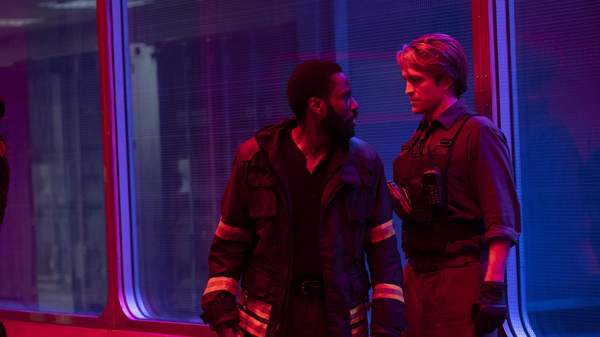Overview
Christopher Nolan has never made a Bond film. He certainly didn't helm The Matrix franchise, either. But combine the two — picking and twisting elements of each, including narrative tropes, sci-fi trickery and special effects wizardry — and the writer/director's latest slick, bold, mind-bending action-thriller Tenet is the end result. The movie's spy flick credentials are established at the outset, thanks to a tense, taut, supremely well-executed opening attack on the jam-packed Kiev Opera House. In a sequence that feels especially unnerving in today's crowd-phobic world, Tenet's nods to late 90s and early 00s sci-fi are evident here, too. Guns fire frequently, but when one in particular discharges, a bullet returns to the weapon rather than shooting out from it. It doesn't occur slowly, yet it still happens noticeably; if you wanted to dub it 'reverse bullet time', that wouldn't feel out of place.
Soon afterwards, in case viewers weren't already thinking about Bond or The Matrix, Tenet's CIA operative protagonist — who is literally called 'the Protagonist' (John David Washington) — navigates his way through a familiar exposition dump-style sequence. A scientist (Clémence Poésy) talks him through some of the nuts and bolts of the shadowy situation he finds himself in, including explaining the inverse trajectory of the bullets. She has gadgets to mention as well. Actually, she has a lot more to say, specifically about inverted objects being sent back through time from the future. They're "the detritus of a coming war," she advises, which the Protagonist needs to prevent or life as everyone knows it will cease to be. Tenet wants you to pay very close attention at this point, with the film laying out oh-so many of the details, tidbits and stakes its plot balances upon. But it's the sight of the Protagonist learning how to fire a reverse bullet, then exclaiming a Keanu-esque "whoa!", that's extra memorable.
If Tenet's premise so far sounds a little vague and convoluted, well, that's its wavelength. As obsessed with time, space, existence and consciousness as many of Nolan's movies, the cerebral film doesn't get any less tangled or labyrinthine from there, and it doesn't ever try to. Teaming up with suave English handler Neil (Robert Pattinson), the Protagonist hops around the globe from India and Estonia to Oslo and the Bay of Naples, with the pair wearing immaculate suits and endeavouring to stop the impending battle. Getting to know an arms dealer, Priya (Bollywood veteran Dimple Kapadia), is a key part of the plan. So is becoming entangled in the strained marriage between art expert Kat (Elizabeth Debicki) and her thick Russian-accented, clearly up-to-no-good husband Andrei Sator (Kenneth Branagh) and, at Neil's suggestion, also crashing a large freight plane into an airport.
There's more to Tenet — much, much, much more, including twists upon twists that are best experienced while watching. But, as it charts the Protagonist's quest, the film boasts the kind of plot that is actually quite straightforward, yet is told in an overly complicated fashion (and in a lengthy way as well, with the feature's 150-minute duration felt). Keeping viewers puzzling for as long as possible is the main aim, and that sometimes comes at the expense of telling a great story in the clearest possible manner. It's a tale that, as a result, can occasionally feel cumbersome instead of thrilling. Nolan likes messing with audiences' heads, as Following, Memento and Insomnia established early, the Dark Knight trilogy continued, and even Dunkirk's structural approach demonstrated, so none of this should come as a surprise. Here, however, he jumps even beyond Inception's leaps, The Prestige's magic tricks and Interstellar's temporal dilations. When Poésy's character tells the Protagonist "don't try to understand it; just feel it," she's obviously speaking to Tenet's viewers as well — and, regardless of who is in the director's chair, that's a lazy cop-out.
Tenet is entertaining, though. When it's at its best, it's downright spectacular. Some of its big setpieces — the aforementioned opera house scene, a breathtaking fight that stretches, sprawls and weaves through narrow corridors, and a narratively superfluous but enthrallingly shot catamaran race, for example — are simply stunning. In fact, like The Matrix's bullet time, fellow action films will be trying to ape Tenet's standout moments for decades to come. Nolan's feature is also impeccably cast, with Washington as charismatic as he was in BlacKkKlansman, Pattinson continuing to choose excellent roles and Kapadia a shrewd delight. Debicki and a forceful Branagh play characters with one-note functions and arcs, but they still have a sizeable impact. Throw in the percussive, suspenseful score by Ludwig Göransson (The Mandalorian) doing his best Hans Zimmer impression, as well as evocative production design by Nolan regular Nathan Crowley and glossy visuals lensed by Hoyte Van Hoytema (an Oscar nominee for Dunkirk), as there's plenty here to love.
That said, there's also a sense that Tenet is bounding forward in some ways, while also needlessly looping back on itself in others. This a film with a palindromic name, and that inverts and reverts time again and again, so that's apt — although, given how meticulous Nolan's work always is, including this movie, the end sensation is unlikely to be intentional. Tenet is stirring, but also laborious. It's designed to not just immerse viewers in an inventive head trip, but to overwhelm; however it makes the audience work hard and feel like they're working. It's intricate and exacting, and also messy and repetitive. Right down to its penchant for frustratingly drowning out some of the dialogue with its thrumming score, it's a Nolan film through and through, in other words — usually to a mesmerising degree, but too indulgently as well.
Features
Information
When
Thursday, November 12, 2020 - Wednesday, December 2, 2020
Thursday, November 12 - Wednesday, December 2, 2020
Where
Various cinemas in MelbournePrice
$15–25-
Event Type
